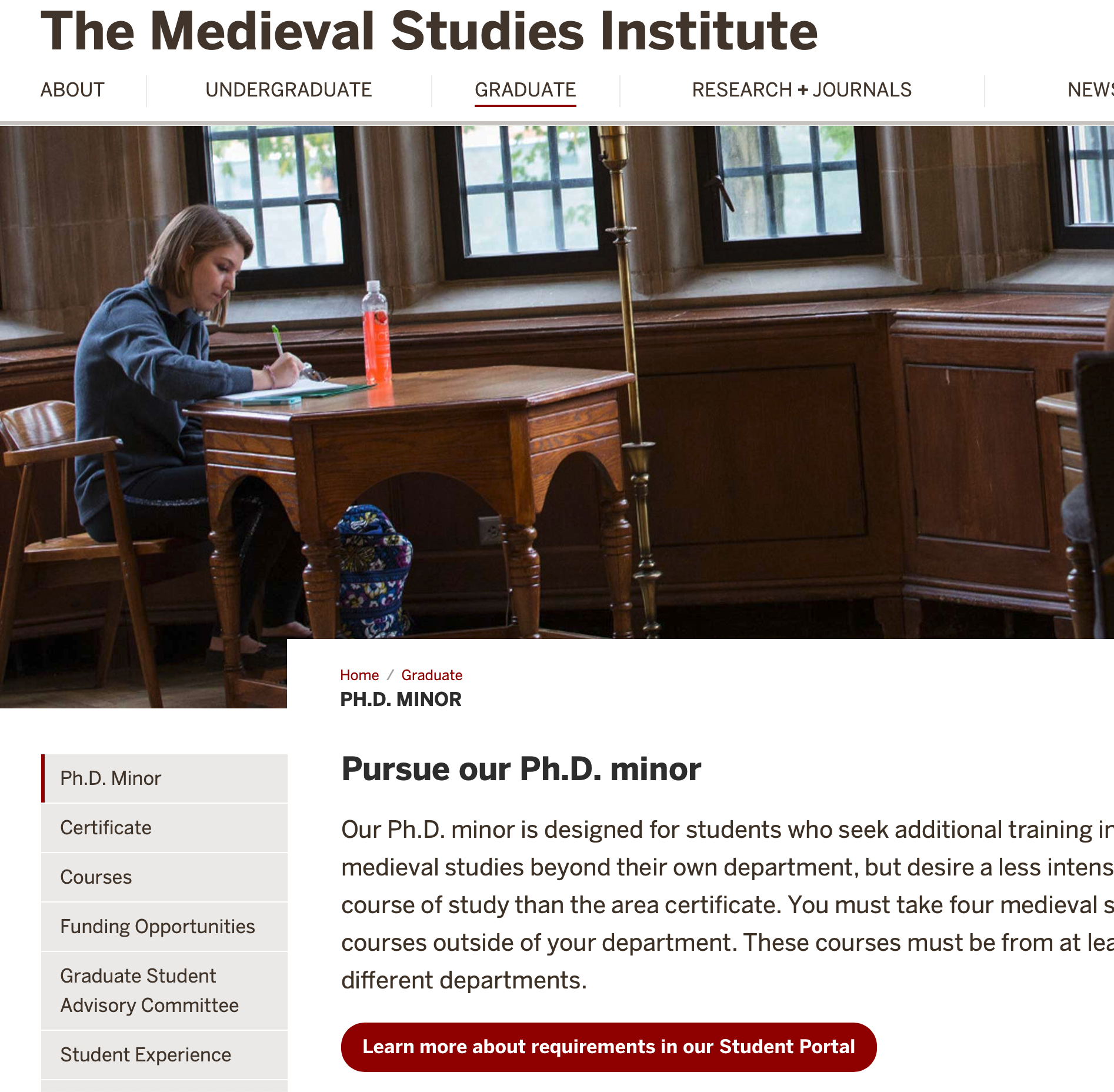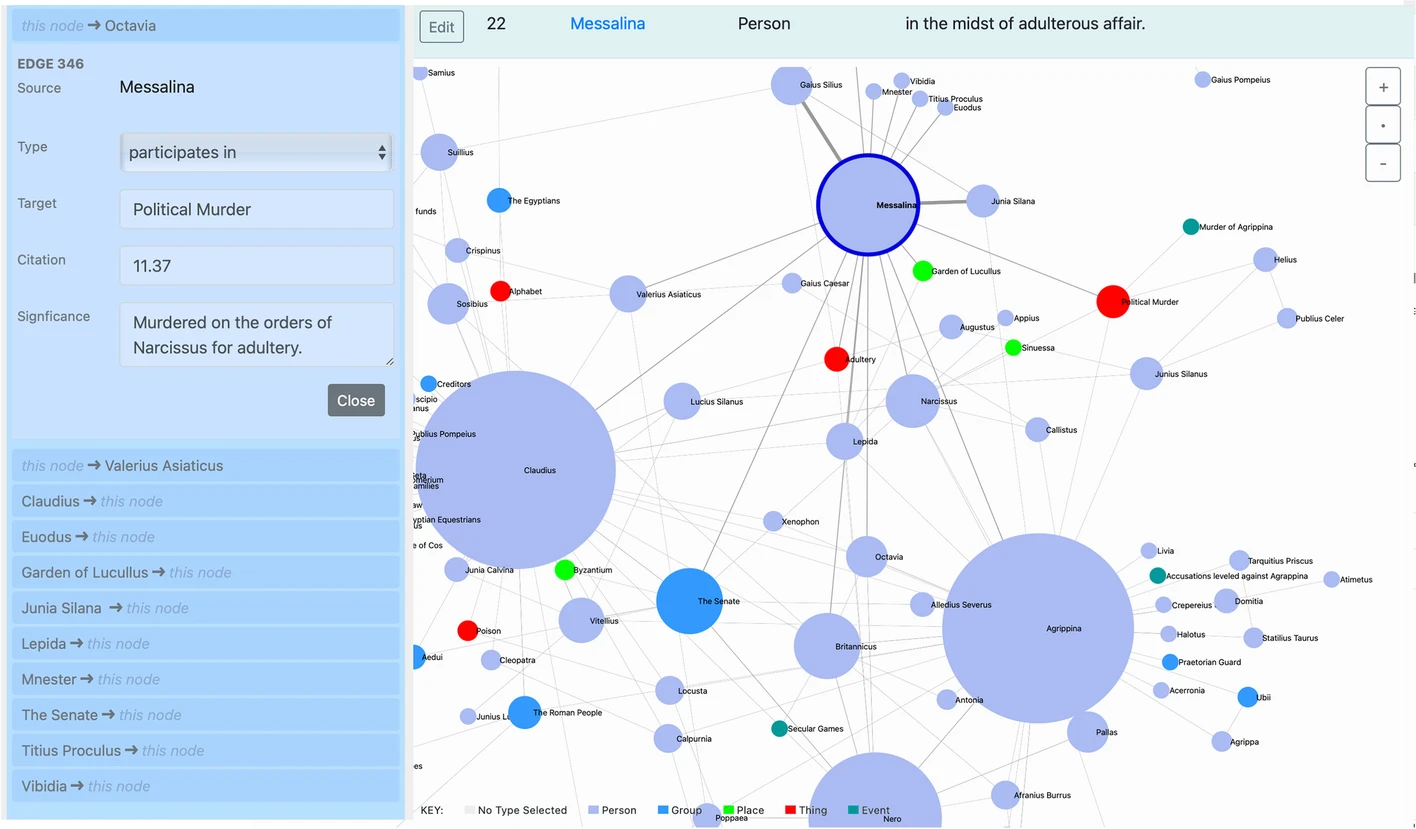
On my appointment as Medieval Studies’ Associate Director in August of 2021, we identified the MEST minor and certificate as a priority for curricular and administrative restructuring in response to shifting definitions of Medieval Studies and significant changes in campus-wide medieval-studies course offerings. I led the MEST team in this process from start to finish, which included a state-of-the-field assessment, an evaluation of other medieval-studies programs, and ongoing mentoring and advising for current MEST minor and certificate recipients.
These studies generated a flexible curricular structure that can adapt to IU’s student needs and faculty offerings (see the 2023-2024 bulletin text below). In Fall of the 2022-23 academic year, after aligning specific program requirements with these newly established goals, I presented the resulting program to the MEST Executive Committee, who approved the new minor and certificate. In Spring of 2023, the MEST affiliate faculty as a whole approved the new minor and certificate, and students can pursue minors and certificates starting in the 2023-24 academic year.
Text of the new bulletin entry for the Medieval Studies Minor and Certificate
Demonstrate your Medieval Studies Expertise
Medieval Studies is defined by connections: between regions, between disciplines, between audiences, and even between time periods. Our Ph.D. minor and certificate are designed to help you make those connections through additional training in medieval studies beyond your own department.
The Medieval Studies minor and the certificate both start with one of four thematic clusters. These clusters allow doctoral students to develop their understanding of medieval studies as an interdisciplinary field and develop the skills required to do advanced research in an area of their choosing. The certificate adds an additional five elective courses to demonstrate advanced research skills in Medieval Studies.**
How to choose between the minor and the certificate
The minor offers a four-course program of studies that substantiates your expertise in Medieval Studies for a secondary area of teaching or research expertise. The minor requirements should be completed prior to the PhD qualifying exams.
The certificate marks Medieval studies as as primary area of teaching and research by extending the coursework from four courses to nine. The certificate can be completed at any point in a Ph.D. program of studies.
The minor and certficate can be earned independently of each other, or you can earn a minor in-course as you pursue the certificate. If you choose to earn a minor in-course, the four-course cluster requirements should be completed prior to the PhD qualifying exams.
Topical Clusters and Requirements
All Medieval Studies Minor and Certificate recipients must complete four courses of 3 to 4 credits each, in a topical cluster.
- Each of the 4 topical clusters for the Medieval Studies minor and certificate require 3 cluster-specialization courses and 1 elective. These 4 courses cannot be double-counted for the Ph.D. major.
- At least one course should be outside your home department.
Courses in which a student receives less than a B (3.0) will not count toward the minor.
Medieval Languages
The “Languages” cluster prepares you to take a language-teaching career path.
- 3 courses distributed between 3 different languages
- 2 of the 3 language courses should include training in pre-1500 forms of that language. (e.g., Medieval Arabic, literary Chinese, Coptic, Old/Middle French, Classical Greek, Old/Middle English, Hebrew, Old Irish, Italian, classical Japanese, Latin, Old Norse, Old Occitan, Persian, Syriac, Sanskrit, Old Tibetan, Middle Welsh; this list is not exhaustive but depends on course availability).
- A 4th elective course.
Global Medieval Studies
The “Global Medieval Studies” cluster addresses research trends in diversity and global interaction and prepares you to consider both the value of a diversifying Medieval Studies and to complicate the idea of “global medieval” as an imposition of Western European norms.
- 3 courses focused on some aspect of the period between 350 C.E. and 1500 C.E. in 3 different geographic regions
- At least 1 course should have a geographic focus outside the Mediterranean and Western Europe.
- A 4th elective course.
Interdisciplinary Methods for Medievalists
The “Interdisciplinary Methods” cluster acknowledges the wide variety of methods medievalists draw on in both research and teaching practices.
- 3 courses focused on some aspect of the period between 350 C.E. and 1500 C.E. using 3 different analytical methods (e.g., 1 in historical methods, 1 in anthropological methods, 1 in comparative literature)
- 1 course of the student’s choice on either:
- any aspect of medieval studies
- methodological training applicable to the student’s medieval research interests (e.g., computational linguistics)
Medievalisms
The “Medievalisms” cluster addresses the public-humanities aspects of medieval studies and encourages research on the form and public impact of medieval tropes in popular culture.
- 3 courses focused on the period between 350 C.E. and 1500 C.E.
- 1 course focused on the reception of medieval concepts in a post-1500 setting
Additional Certificate Requirements
In addition to the topical-cluster requirements, certificate recipients will
- take five additional 3- or 4-credit courses with a medieval-studies focus for a total of nine courses
- demonstrate advanced proficiency in at least one medieval language (see the Medieval Languages topical cluster for a sample list). Advanced proficiency in a language can be established through for-credit completion of two advanced courses in philology or literary studies of the language in question (which can count toward the certificate), through very specific undergraduate language courses listed in the graduate bulletin, or by appropriate advanced examination.
